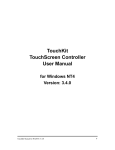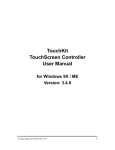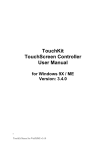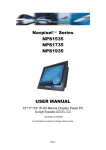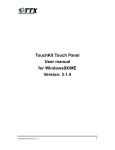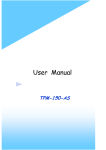Download Barco iUtilities User manual
Transcript
TouchKit Barco TouchScreen Controller Installation & User Manual for Windows 2000/XP (This page intentionally left blank.) 2 Barco TouchScreen Controller Chapter 1. Installing TouchKit Chapter 1. Installing TouchKit TouchKit is software that contains drivers of the touch panel and two other utilities. The two utilities are: • Touch Tray support This is a utility for emulating the right and left button of the mouse for controlling the touch panel. Users can toggle between right or left mouse buttons using this utility. • Configuration support The calibration and draw test of the touch panel are done by this utility. Follow these steps to install TouchKit. 1. Put the TouchKit CD into the CD-ROM drive. 2. When Autoplay is enabled on the PC, the install menu opens automatically. When Autoplay is not enabled, open the CD-ROM window and double-click Autorun.hta. As a consequence the install menu opens. 3. Click Install touch screen driver to start installation. Do not plug the USB controller in the system before the installation has been finished. 4. Click [Next >] to continue the installation. Barco TouchScreen Controller 3 Chapter 1. Installing TouchKit 4 5. Don't change the default setting. The default setting is unchecked. Then Press [Next >] to continue installation. 6. Choose the setup type that best suits your needs. There are two TouchKit accessory utilities for choosing: Rotation Monitor Utility and Shutdown Utility. You can install the utility you want by checking the box. Then Press [Next >] to continue installation. Barco TouchScreen Controller Chapter 1. Installing TouchKit 7. Select the appropriate folder where setup files will be installed. Then press [Next >] to continue installation. 8. Enter the name of the program folder for TouchKit or press [Next >] to accept the default folder and continue. Barco TouchScreen Controller 5 Chapter 1. Installing TouchKit 9. During driver installation, the setup program will scan the COM ports to install the RS232 Touchkit controller. On Windows XP, the Touchkit controller driver will be installed automatically. Windows XP will prompt a warning message that the driver has not passed Windows logo testing. Press [Continue Anyway] to continue installation. 10. Windows copies files to the disk and the setup is complete. After finishing the installation, the computer needs to be rebooted. 6 Barco TouchScreen Controller Chapter 1. Installing TouchKit 11. After Touchkit installation, plug the USB touch controller into the computer. The Hardware wizard finds this hardware. Press [Next >]. It will search for the proper driver for the Touchkit controller device and install it automatically. Barco TouchScreen Controller 7 Chapter 1. Installing TouchKit After the driver is installed, Press [Finish >] to complete the USB device installation. 12. You can check the situation of controllers in the Device Manager. If the controller is set up well, the device manager will show the following entries. 8 Barco TouchScreen Controller Chapter 1. Installing TouchKit TouchKit USB controller works well TouchKit USB controller works well Barco TouchScreen Controller 9 Chapter 2. Configuration Utility and Right Button Emulator Chapter 2. Configuration Utility and Right Button Emulator There are five property pages in the TouchKit utility: General, Setting, Edge coefficient, Monitors and About. Each property page contains different functions for users to do the adjustments. Therefore, users can easily manage all the TouchKit controllers through the TouchKit utility. General The General property page contains the functions of language selection, devices add/ remove (Only for RS-232 controllers), 4 points calibration, Draw test and Advanced. 10 Barco TouchScreen Controller Chapter 2. Configuration Utility and Right Button Emulator <Language> TouchKit supports multi-language user interfaces. You can select the native language that is compatible to the operation system. For example, if the operation system is a traditional Chinese version, you could see the normal display words under the traditional Chinese and English mode. There are ten different languages supported: English, Traditional Chinese, Simplified Chinese, French, Spanish, German, Japanese, Italian, Korean and Dutch. Barco TouchScreen Controller 11 Chapter 2. Configuration Utility and Right Button Emulator Select the compatible language first or users may not see the normal display of each button. <Add> / <Remove> Please check if the touch panel devices (including their controller) are installed properly. The controllers are displayed in the Panel List box. You can get the information of interface, type, firmware version for each controller. Selecting a controller in the panel list box activates the corresponding touch panel. USB controllers are listed automatically as soon they are plugged in. The program will also remove the controllers automatically as soon as they are unplugged. Note: After adding a controller, remember to calibrate the panel first before using it. 12 Barco TouchScreen Controller Chapter 2. Configuration Utility and Right Button Emulator There are three buttons at the lower section of the General property page: [4pts Cal] [Draw Test] [Advanced]. Important Note: In Multi-head setups the Monitor mapping needs to be performed before calibration. See Monitors on page 26. <4pts Cal> The 4-points calibration allows to calibrate the touch screen and map the touch screen input to the Windows desktop. Press [4 pts Cal]. The following pattern appears. Barco TouchScreen Controller 13 Chapter 2. Configuration Utility and Right Button Emulator Touch the blinking symbol on the screen until the computer beeps or the symbol stops blinking. After calibration, new calibration parameters are stored in the display memory, overwriting the previous ones. Important: Do not touch the touch screen until the main screen appears again. Otherwise the new calibration parameters will not be written to the display memory and the calibration will have to be redone. <Draw Test> With Draw Test you can test the calibration of the touch screen. Click on the [Draw Test] button. A rastered pattern appears where you can test the touch screen. 14 Barco TouchScreen Controller Chapter 2. Configuration Utility and Right Button Emulator In the drawing test window, you can click [Clear] to clear the window. Also, you can click [Quit] or press the right mouse button to quit from the drawing test. In the drawing test window, you can verify the panel linearity, calibration precision, and line drawing quality. <Advanced> Touchkit also provides a more accurate 25 points touch screen calibration. The 25 points calibration is recommended for improved accuracy. Press [Clear] to clear the previous calibration parameters. Barco TouchScreen Controller 15 Chapter 2. Configuration Utility and Right Button Emulator If you press [Yes] the calibration parameters in display memory are cleared and replaced by the default calibration parameters. Press [25ptCal] in the Advanced window to start the 25 points calibration. The following pattern appears. Touch the blinking symbol on the screen until the computer beeps or the symbol stops blinking. After calibration, new calibration parameters are stored in the display memory, overwriting the previous ones. Important: Do not touch the touch screen until the main screen appears again. Otherwise the new calibration parameters will not be written to the display memory and the calibration will have to be redone. Setting There are three functional groups in the Setting property page: Sound options, Mouse Mode and Double Click Adjustment. 16 Barco TouchScreen Controller Chapter 2. Configuration Utility and Right Button Emulator Sound options The Sound options provide users an audible feedback when touching the panel. Select the preferred option. <No Sound> Select to disable the sound when using the touch panel. <Touch Down> The system will make a sound when touching the panel. <Lift Up> The system will make a sound when the finger is lifted from the touch panel. <Frequency> To adjust the sound frequency, drag the cursor from left (low frequency) to right (high frequency). Barco TouchScreen Controller 17 Chapter 2. Configuration Utility and Right Button Emulator <Duration> To adjust the sound duration, drag the cursor from left (short) to right (long). Mouse mode The Mouse Mode provides users with different operating options. They are as follows: <Mouse Button> Click this button to show/hide the Touch Tray on the right bottom corner of the desktop. You can also show or hide the Touch Tray by clicking the mouse icon in the taskbar, which is loaded at computer startup. 18 Barco TouchScreen Controller Chapter 2. Configuration Utility and Right Button Emulator Touch tray Mouse icon You can select to which mouse button a touch on the touch panel corresponds. Change right/left button by clicking the upper small rectangular box of Touch Tray. The blue area expresses what button has been selected. <Shutdown utility> The Shutdown utility is available only when it was selected to be installed during setup. Click on the shutdown utility in the task bar. Barco TouchScreen Controller 19 Chapter 2. Configuration Utility and Right Button Emulator Shutdown utility dialog There are five buttons in the shutdown utility. [Standby] to enter standby mode, saving power consumption. [Shutdown] to turn off the PC. [Reboot] to restart the PC. [Cancel] to minimize the Shutdown utility dialog. [Exit] to close the Shutdown utility. <Mouse Mode> There are three kinds of mouse modes you can choose: [Normal Mode] Provides all the mouse functions, including the dragging function. [Click on Touch] Click action is executed as soon as users touch the panel. [Click on Release] Click action will not be executed until finger leaves the panel. <Option> Touchkit provides an option for advanced Mouse Emulation setting. When the Option button is pressed, a setting property sheet will be popped up. Support Constant Touch and Support Auto Right Button check boxes are shown in the property sheet to enable / disable Constant touch and Auto right button support. 20 Barco TouchScreen Controller Chapter 2. Configuration Utility and Right Button Emulator [Constant Touch] Enable Constant Touch to force the driver to stop reporting touch points when the movement is within the defined range. Therefore, the user can see a stabilized cursor instead of a chattering cursor when users touch the same point with unwanted noise. Use this option to optimize the response of the touch screen for finger operation. For stylus operation & drawing it is not recommended to use the constant touch feature This option is switched off by default. [Auto Right Button] Enable Auto Right Button to force the driver to report a right click mouse event to OS when users perform a continuous (without moving) touch till time out. This way the Touchtray program to activate a right click is no longer needed. This feature helps users to perform a right click more easily using the touchscreen. About Cursor Visibility Cursor visibility function provides users to hide the cursor in the display. Please go to Start / Settings / Control Panel / Mouse / Pointers / Scheme, and choose TouchKit Hide Cursor. Press Barco TouchScreen Controller 21 Chapter 2. Configuration Utility and Right Button Emulator [Apply] to apply the setting, and press [OK] to close the property page. If you want to cancel the function of TouchKit Hide Cursor, do the steps again and choose another scheme. Double click adjustment The Double Click adjustment provides users to set up the doubleclick speed and area tolerance. 22 Barco TouchScreen Controller Chapter 2. Configuration Utility and Right Button Emulator <Double Click Speed> Double Click Speed is the double-click response time for Windows. You can adjust the double-click speed to make it easier performing double-clicks on the touch panel. <Double Click Area> When performing a double-click on the touch screen it may be hard to touch the screen twice on the same spot. Slide the Double-click area slider towards <Larger> to enlarge the double-click area. Slide towards <Smaller> to reduce the double-click area. Change this setting only in case you experience difficulties to perform double-clicks. Edge Coefficient The Edge Coefficient property page contains the functions of Edge Compensation for Top, Bottom, Left, Right, X Axis and Y Axis. In some case, if it is difficult to touch items at the edges of the touch panel. In that case, you can set adjustments to reach the edges of the screen image. Barco TouchScreen Controller 23 Chapter 2. Configuration Utility and Right Button Emulator <Top> If users set the Edge to <Smaller>, TouchKit will reduce the horizontal position of the top edge. If users set the Edge to <Larger>, TouchKit will extend the horizontal position of the top edge. <Bottom> If users set the Edge to <Smaller>, TouchKit will reduce the horizontal position of the bottom edge. If users set the Edge to <Larger>, TouchKit will extend the horizontal position of the bottom edge. <Left> If users set the Edge to <Smaller>, TouchKit will reduce the vertical position of the left edge. If users set the Edge to <Larger>, TouchKit will extend the vertical position of the left edge. <Right> If users set the Edge to <Smaller>, TouchKit will reduce the vertical position of the right edge. If users set the Edge to <Larger>, TouchKit will extend the vertical position of the right edge. <Offset X Axis> / <Offset Y Axis> In some cases, the cursor will be behind the finger when users touch the panel. If users cannot see the cursor when they touch the panel, users can the set X Axis or Y Axis offset to move the cursor. However this is generally not recommended. If users set the Offset X Axis to <Smaller>, the cursor will be moved a number of pixels to the left. If users set the Offset X 24 Barco TouchScreen Controller Chapter 2. Configuration Utility and Right Button Emulator Axis to <Larger>, the cursor will be moved a number of pixels to the right. If users set the Offset Y Axis to <Smaller>, the cursor will be moved a number of pixels to the top. If users set the Offset Y Axis to <Larger>, the cursor will be moved a number of pixels to the bottom. <Edge Compensation Switch> Users can Enable / Disable Edge compensation at the left bottom corner of Touchkit Utility. The +10% and -10% buttons will adjust the edge settings. If you press the +10% button, the top, bottom, left and right edges will extend by 10% and the Offset X and Y Axis settings increase with 10 pixels. If you press the -10% button, the top, bottom, left and right edges will decrease by 10% and the Offset X and Y Axis settings decrease with 10 pixels. Click Default to restore the default settings. Barco TouchScreen Controller 25 Chapter 2. Configuration Utility and Right Button Emulator Monitors There are three functions in this property page: Multiple Monitors, Split Monitor and One Point Calibration. <Multiple Monitors> To configure the mapping relationship between the monitors and the touch panels, select the monitor page as below. Set the check box (Use Multiple Monitors) to enable multiple monitors mapping. Unchecking this box will disable multiplemonitor configuration, and all of the touch panel controllers will be mapped to the primary monitor. The gray shadow area is the monitor mapped the selected controller/panel. The button [Mapping] is used to map the relationships between the monitors and touch panel controllers. Press [Mapping]. The software will prompt to touch the corresponding monitor to obtain the mapping relationship. Touch the screen that says "touch". Repeat for every screen. 26 Barco TouchScreen Controller Chapter 2. Configuration Utility and Right Button Emulator After finishing monitor mapping, Press [Apply] to apply the mapping relation!! Special Case: When you have a dual (or more) screen setup and you have only one (or more minus 1) touch screen display, you cannot use the mapping tool (it will ask you to touch each screen, and you can only "touch" one since there's only one touch screen). In this case you need to map the single touch screen manually, which is done as follows: 1. Select the touch screen controller in the Monitor Tab. 2. Now select the display head (layout is the same as in "Display settings - Settings") where the MFCD 1219 TS is connected to by clicking it. It will become gray when selected. When using the split monitor function, we need to define the location (in pixels) & resolution where the display is present (see <Split Monitors> on page 28). 3. Press Apply to apply the setting. 4. Now touch the touch screen. If the mapping is correct, the pointer will appear on the correct screen. If the pointer appears on the wrong screen, the mapping is incorrect. Please repeat the steps above and select the correct display head. Barco TouchScreen Controller 27 Chapter 2. Configuration Utility and Right Button Emulator <Split Monitors> Split monitor is needed when your graphics board uses a spread desktop, spread over 2 or more monitors. To use the Split Monitor function, you need to select which touch screen controller you want to define the location and resolution for. Make sure that Multiple Monitors and Split Monitor are both enabled. Press [Split Setting] to set up the activate area. It shows the current resolution of display and users can set up the activate area by inputting the value by yourself or use the default button [Upper Half], [Left Half] or [Quarter]. The default value of panel resolution should be full screen as Left: 0, Right: 0, Top: 0 and Bottom: 0. <One Point Calibration> The Touchkit utility provides a fast tool to identify the touchscreen orientation when the monitor display was rotated by 90 degrees. When enabled, Touchtray will pop up the One Point Calibration tool for users to identify and correct the touchscreen / monitor orientation whenever the monitors was rotated by 90 degrees. When disabled, Touchtray does not pop up the One Point Calibration tool. Then, the user has to do the 4-points calibration to correct the orientation whenever the monitor was rotated. 28 Barco TouchScreen Controller Chapter 2. Configuration Utility and Right Button Emulator About Information about TouchKit. Barco TouchScreen Controller 29 Chapter 2. Configuration Utility and Right Button Emulator 30 Barco TouchScreen Controller B4100456 - 00 November 2005 www.barco.com
































